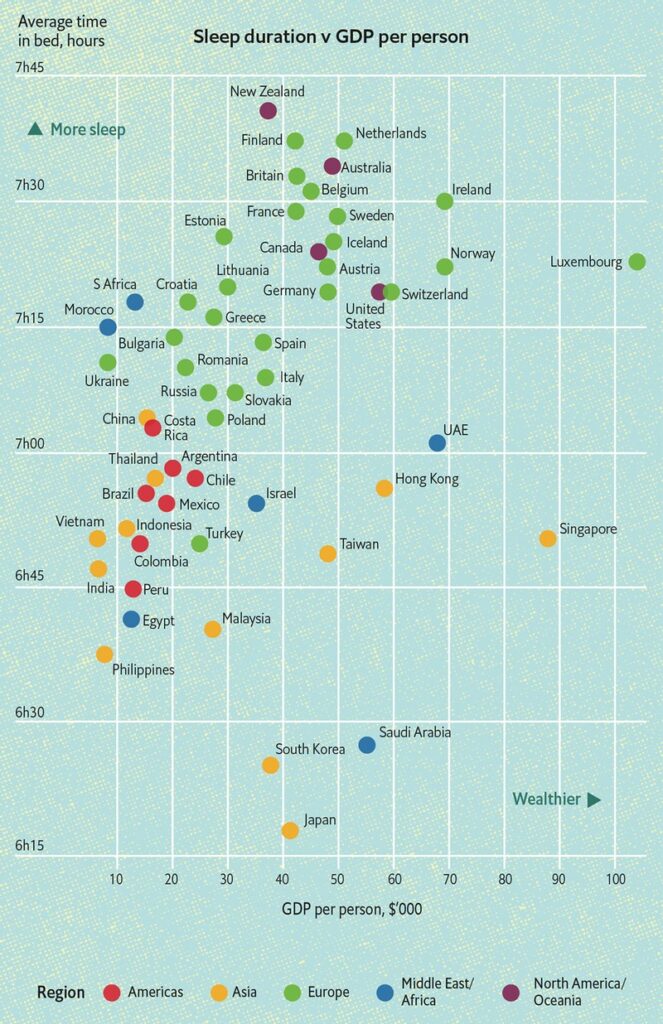There are few things more uncomfortable and debilitating to the human mind and body than sleep deprivation. Our bodies will attempt to shut down even when personal safety is at great risk. Beyond a drowsy, head-on collision with a semi-truck, sleep holds important implications in mental health, physical health, and even a country’s economy and your earning potential.
Determinants of health
Human health is a complex and dynamic spectrum composed of countless mental and physical elements. There are innumerable definitions of “optimal health”, but, for the sake of simplicity, let us define it as achieving peak mental and physical contentment without encumbrance or disease.
The foundational piece that affects both mental and physical health is sleep.[1] Canadians sleep for an average of 7 hours and 7 minutes per day.[2] Balance in sleep, as in many other areas of our lives, is critical:
Too little sleep is associated with:[3]
- hypertension
- diabetes
- cognitive impairment
- increased mortality
Too much sleep is associated with:[4]
- depression
- obesity
- diabetes
- hypertension
- cardiovascular disease
There are conflicting findings surrounding the associations of too much sleep, but there is little to no objection regarding the negative effects of insufficient sleep and insomnia. Japan even coined a term for the phenomenon of death caused by lack of sleep – karoshi.[5] Knowing that there is a significant correlation between too much/too little sleep and health, how does it affect our lives, and what is the sweet spot? Is sleep cultural? If so, how does it vary from country to country?
Counting sheep (and sleep … and dollars)
Is the Canadian daily average sleep of 7 hours and 7 minutes ideal?[6] One might look at an “optimal” amount of sleep to be either maximization of personal performance in a given area or one’s ability to cope with stressors (depending on whether our cup is half full or half empty).
One study shows that those who are sleep deprived react the same physiologically to a low-stressor event as those who are not sleep deprived react to a high-stressor event.[7] The idea that one’s ability to cope is inhibited by insufficient sleep hours is not earth-shattering news to most of us.
So, how much sleep is optimal? Some research suggests that for a healthy individual, a range of 7 hours and 7 minutes to 7 hours and 30 minutes is the sweet spot for cognitive function.[8] How much of a difference can optimal sleep make? A study on college students measured performance on tests and found a 25% variance in scores, which they attributed to sleep.[9] Surprisingly, the amount of sleep the night before an exam did not affect test scores significantly. The amount of cumulative sleep in the week prior was a better indicator in this research.
It has also been illustrated that sleep has an impact on physical performance and recovery. Elite athletes may need 9-10 hours of sleep per day in order for adequate recovery and skill-set adaptation to occur. In research on athletes trying to adhere to a daily sleep target of 10 hours, basketball players experienced a significantly better free-throw percentage, 3-point-shot percentage, and sprint time.[10]
Are sleep habits driven by culture? Countries seem to have unique trends, and the breadth between extremes is substantial. The difference between Japan, holding the lowest average hours of sleep per day, and New Zealand, with the highest average hours of sleep per day, is almost 1 hour and 20 minutes. Countries tend to cluster in continents in terms of hours of sleep per day, suggesting a regional correlation.[11]
There are two important considerations when measuring an individual’s sleep and how it relates to economics:
1) Hours of sleep in relation to earning potential
2) Hours of sleep in relation to production potential – that is, how much each citizen contributes to the country’s economy by way of its gross domestic product (GDP).

Hours of sleep in relation to earning potential
As you might imagine, sleep and earning potential have an inverse relationship when examined in a linear fashion.[12] The theory is that people who sleep less work more and therefore earn more. However, when experiment variables such as daylight hours (i.e. an earlier or later sunset/sunrise) are controlled, researchers have found a positive correlation between work and sleep. Further, researchers suggest that adding one hour of sleep per week signals an increase in earnings of 16%.[13] Putting that in context, in 2018, the median after-tax income for Canadian families and unattached individuals was $61,400.[14] Based on the model provided, the earner with one extra hour of slumber would be making $71,224, which is an increase of $9,824.
Hours of sleep in relation to production potential
GDP is the standard measure of monetary value of goods and services produced by a country during a period.[15] To break down GDP on a per-citizen basis (“per capita”), divide total GDP by a nation’s population. At a basic level, this can offer insight on individual contribution to the economy. Researchers suggest that insufficient sleep is a principal factor in the number of work days an employee misses in a year, which takes a hefty toll on the economy. Examining five countries in the Organization for Economic Co-operation and Development (OECD), data indicates that sleep deprivation is costing countries many billions of dollars per year (only time-loss costs are considered here; quality of an employee’s work should also be considered):[16][17]
Canada – $21.4 billion
United States – $411 billion
United Kingdom – $50 billion
Germany – $60 billion
Japan – $138 billion
To the researchers’ credit, they identify the caveat in their study that they are making assumptions (albeit supported by data) regarding poor sleep, which is usually self-reported, as well as about work quality, production quality, and absenteeism. This approach can be challenged with the chicken-and-egg concept regarding the effect of sleep on health issues and vice versa.
Length isn’t everything
Simply sleeping more hours in a day may not be the answer to earning more and producing more, and operating at a higher state. Even employees who indicated that they “seldom” had trouble sleeping missed, on average, six days of work per year. This association was stronger and the number of missed days was higher as the level of difficulty sleeping increased.[18]
Perhaps of more concern than absenteeism is presenteeism – the concept that while workers are in attendance, their production capacity is hindered by other factors.[19] Fatigue-related productivity costs were estimated at $1,967 per employee, per year.[20] Of particular concern is that 56% of workers report poor sleep quality.[21] Regular sleep disturbances were associated with a higher cost in health care of $5,206 per poor sleeper, which is about $3,461 more than their sound-sleeping counterparts.[22]
Sleep is now recognized as such an important factor in health, happiness, and productivity that some companies have introduced sleep incentives to their workforces.[23] Forget massages and acupuncture, business owners and managers looking to improve both the bottom line and employee contentment might be best advised to think outside the box, and inside a dark, quiet room in which workers can catch some zees.
[1] https://www.ncbi.nlm.nih.gov/pmc/articles/PMC3972485/
[2] https://www150.statcan.gc.ca/n1/pub/82-003-x/2017009/article/54857-eng.htm
[3] https://www.ncbi.nlm.nih.gov/pmc/articles/PMC3972485/
[4] https://pubmed.ncbi.nlm.nih.gov/20621406/
[5] https://www.weforum.org/agenda/2019/01/this-is-how-companies-in-japan-are-fighting-sleeplessness-epidemic/
[6] https://www150.statcan.gc.ca/n1/pub/82-003-x/2017009/article/54857-eng.htm
[7] https://www.ncbi.nlm.nih.gov/pmc/articles/PMC6281147/
[8] https://www.ncbi.nlm.nih.gov/pmc/articles/PMC6281147/
[9] https://www.nature.com/articles/s41539-019-0055-z
[10] https://journals.lww.com/nsca-scj/Fulltext/2013/10000/Sleep,_Recovery,_and_Athletic_Performance___A.8.aspx
[11] https://www.economist.com/1843/2018/03/01/which-countries-get-the-most-sleep
[12] https://online.wsj.com/public/resources/documents/091814sleep.pdf
[13] https://online.wsj.com/public/resources/documents/091814sleep.pdf
[14] https://www150.statcan.gc.ca/n1/daily-quotidien/200224/dq200224a-eng.htm
[15] http://www.oecd.org/berlin/44681640.pdf
[16] https://www.rand.org/randeurope/research/projects/the-value-of-the-sleep-economy.html
[17] https://www.ncbi.nlm.nih.gov/pmc/articles/PMC4610176/
[18] https://www.ncbi.nlm.nih.gov/pmc/articles/PMC4610176/
[19] https://www.nsc.org/workplace/safety-topics/fatigue/cost-of-fatigue-at-work
[20]https://journals.lww.com/joem/Abstract/2010/01000/The_Cost_of_Poor_Sleep__Workplace_Productivity.13.aspx
[21] https://www.ncbi.nlm.nih.gov/pmc/articles/PMC4610176/
[22] https://www.ncbi.nlm.nih.gov/pmc/articles/PMC4610176/
[23] https://www.weforum.org/agenda/2019/01/this-is-how-companies-in-japan-are-fighting-sleeplessness-epidemic/
(Brendan Rolfe – BIG Media Ltd., 2021)


